Mannheim Master in Data Science
Recognition of coursework and examinations
Which requirements must be met in order to have coursework and examinations recognized?
- The skills acquired in the course you would like to have recognized must largely correspond to those of the module you wish to substitute in Mannheim.
- Before you make a request for recognition, please check that the course contents and workload are more or less identical. To this end, we ask you to compare the Mannheim module descriptions with the contents and workload of your courses abroad.
Please note: The conversion ratio of credit hours to ECTS credits is about 1.5. This means for instance that a module with a workload of 6 ECTS credits corresponds to approximately 4 credit hours. It is also possible to combine several courses or modules to cover equivalent contents.
How do I request recognition of coursework and examinations?
Requests must be submitted to the examination committee in writing using the application form (PDF, 226 kB). Please make sure to indicate your address, student ID number and e-mail address in case we need to contact you for follow-up questions. We also ask you to state the semester in which you started your master's program so that we know straight away which examination regulations apply to you.
Coursework and examinations that you completed in the course of a degree program at an official or officially recognized higher education institution (in Germany or abroad) or at a public university of cooperative education (Berufsakademie) may be credited upon request, provided the competences acquired largely correspond to those taught in the MMDS program in Mannheim.
Due to the ongoing Corona situation, you can submit your application via your university email address. Please send your documents to .
Which documents to I need to submit for recognition?
In order to have your coursework and examinations recognized, you need to hand in the following documents:
- a written, formal request (PDF, 226 kB) for recognition of examinations stating which completed modules you would like to have recognized and which modules at the University of Mannheim you would like to substitute with these.
- A current, officially certified Transcript of Records. In case your degree certificate was not issued in German or English, please submit an officially certified German or English translation.
- documents proving the skills you acquired (in brief) and the contents of the courses. Please bear in mind that we cannot process your request without proof of the competences you acquired in the module or course. Proof can be given in the form of excerpts from module descriptions with learning objectives, or learning outcomes defined in course catalogs, program handbooks, certificates or lecture scripts with references, or – if applicable – printouts from the Internet or links to relevant information on the Internet. Please send us this information in electronic form and as a printout.
Where can I submit the documents?
Please hand in the complete documents, including the certifications listed above, to the examination committee.
Please note that we cannot make a final decision on possible recognition until after you have enrolled at the University of Mannheim. Unfortunately, we are therefore unable to give you any definite information on this matter beforehand.
Degree plans and course schedules
The Mannheim Master in Data Science (MMDS) program equips students with the knowledge and skills necessary to gain operational insight into large and complex datasets. It covers six major areas: Fundamentals, Data Management, Data Analytics, Responsible Data Science, Projects and Seminars, and the Master’s Thesis.
Fundamentals (0 – 14 ECTS)
The goal of the Fundamentals area is to align the different knowledge students acquired in their previous degree programs. Graduates of computer science and mathematics programs will acquire the knowledge required in empirical research (in particular, data collection and multivariate statistics). Graduates of social sciences programs and other fields will acquire the knowledge required in computer science (in particular, programming and database technology).
Data Management (18 – 36 ECTS)
One of the central challenges in the Big Data area is to handle the enormous amount, speed, heterogeneity, and quality of the data collected in industry, the public sector, and science. The Data Management area covers methods and concepts for obtaining, storing, integrating, managing, querying, and processing large amounts of data. The area includes courses on modern data management technology (such as parallel database systems, Spark, and NoSQL databases), data integration, information retrieval and search, software engineering, and algorithms.
Data Analytics (30 – 54 ECTS)
The Data Analytics area forms the core of the study program. It provides courses ranging from data mining, machine learning, and decision support, over text analytics and natural language processing, to advanced social science methods such as cross-sectional and longitudinal data analysis. The range of methodological courses is enhanced by courses on optimization, visualization, mathematics and information, and algebraic statistics.
Responsible Data Science (3 – 10 ECTS)There are great concerns about the use of data. A variety of stakeholders are increasingly becoming concerned about the irresponsible use of data. Within this field, students study data science techniques, infrastructures and approaches in order to make them more responsible.
Projects and Seminars (14 – 18 ECTS)
The Projects and Seminars area introduces students to independent research and teaches the skills necessary to successfully participate in and contribute to larger data science projects. The area consists of research seminars, individual projects, team projects. The projects are conducted jointly with industrial partners and/
or support ongoing research efforts of participating institutes. Master’s Thesis (30 ECTS)
In the master’s thesis, students apply what they learned throughout the program. The master’s thesis is written over a period of six months. Students are encouraged to write their thesis either in the context of research projects conducted by participating institutes or in cooperation with an industrial partner. Students often write their master’s thesis in cooperation with a company from the MMDS Industry Partner Network.
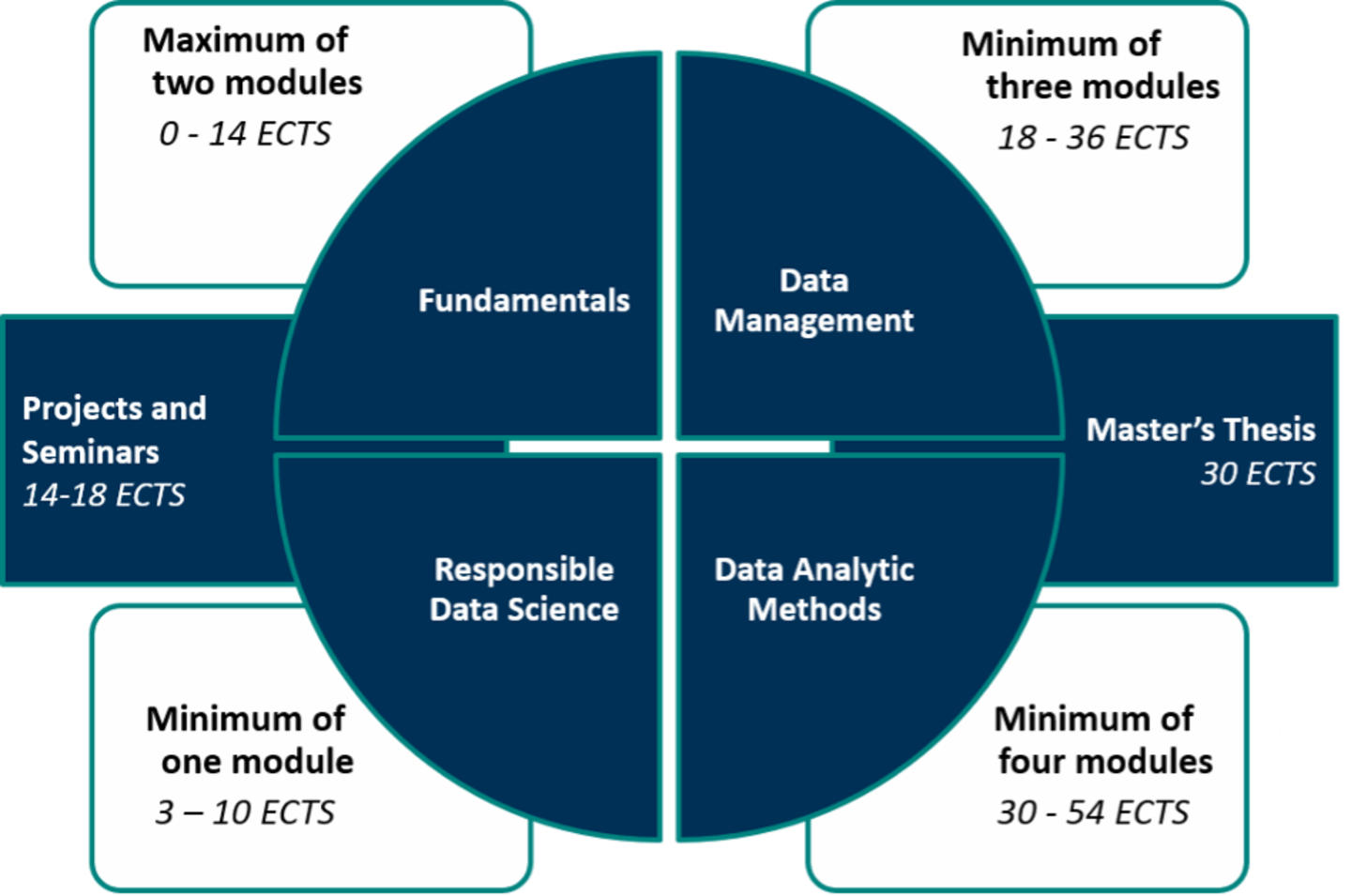
Course schedule
For students that started their masters before HWS 24
Examinations
There are various forms of examination at the University of Mannheim, with written examinations playing a central role. These are held in fixed examination periods. There are two examination periods per semester: The first usually begins immediately after the end of the lecture period, while the second usually starts in the week before the start of the new semester.
In addition to written examinations, students also have other examination formats at their disposal, such as assignments, projects or oral examinations. These offer the opportunity to perform individually in different contexts.
You can find more information about examinations here.Examination regulations and module catalog
The module catalog 2024/
2025 (PDF, 2 MB) and the appendix (PDF, 300 kB) (PDF, 320 kB)give an overview of the course and contents of the program (for students starting before autumn 2024). Please read the examination regulations of your program carefully.
Examination committee
Chairman
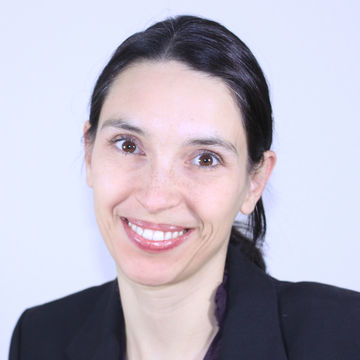
Prof. Dr. Margret Keuper
Chair of Machine LearningUniversity of Mannheim
Mannheim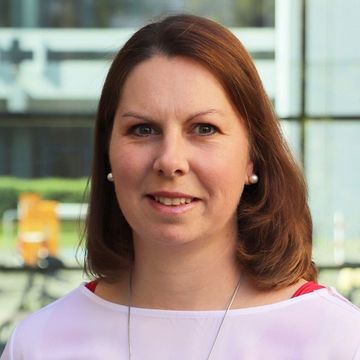 Credit: Emilie Orgler
Credit: Emilie OrglerBirgit Czanderle, M.A.
Student Success Coordinator, Study Coach Business Informatics, MMDS and MMSDS, Contact to Examination CommitteeUniversity of Mannheim
School of Business Informatics and Mathematics
B 6, 26
Gebäudeteil B – Room B 0.05
68159 MannheimConsultation hour(s):
by appointmentStudent representative: Alexander Haberling
You can contact the examination committee via pruefungsausschuss.wimuni-mannheim.de
Tasks of the central examination committee
We are responsible for the following topics:
- Advice on examination regulations
- Advice on module changes
- Advice in individual cases (such as extension of deadlines)
- Approval of reasons for withdrawal or delay
- Extension of examination deadlines
- Serious cases of cheating and breaches of regulations
- Determination of definitive failure with no option to re-sit
- Identification of missed deadlines
- Invalidity of examinations
- Appeal procedure
- Recognition of coursework and examinations
- Semester recognition certificates for BAföG, form 5 according to § 48 BAföG (also for LAG WPO)
Advisory service
The student advisory (run by the study coach and program manager) is a combined offer for the Mannheim Master in Data Science program.
You can consult us in questions regarding:
- the study program
- the module catalog
- the examination regulations
- cases of hardship
- questions about module changes
- course contents
- your degree plan (modules, tracks, thesis)
You can contact the advisory service via studienberatung.wimuni-mannheim.de.
 Credit: Emilie Orgler
Credit: Emilie OrglerBirgit Czanderle, M.A.
Student Success Coordinator, Study Coach Business Informatics, MMDS and MMSDS, Contact to Examination CommitteeUniversity of Mannheim
School of Business Informatics and Mathematics
B 6, 26
Gebäudeteil B – Room B 0.05
68159 MannheimConsultation hour(s):
by appointment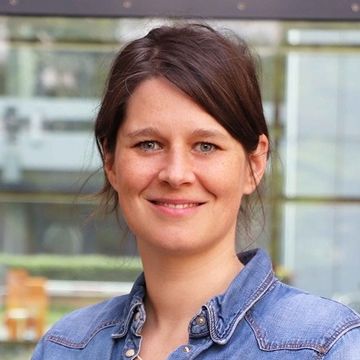 Credit: Emilie Orgler
Credit: Emilie OrglerLisa Wessa, M.A.
Program Manager B.Sc. Business Mathematics, B.Sc. Business Informatics, Mannheim Master in Data ScienceUniversity of Mannheim
School of Business Informatics and Mathematics
B 6, 26
Gebäudeteil B – Room B1.04
68159 MannheimConsultation hour(s):
You can reach me Mondays 11:00 a.m – 12:00 p.m. via phone or via E-Mail. Online-Appointments are possible.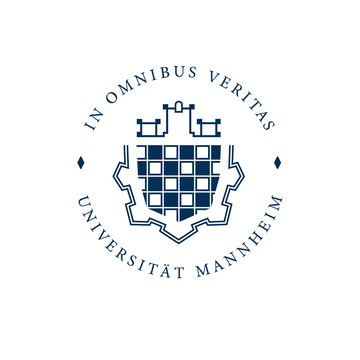
Contact the School of Business Informatics and Mathematics
University of Mannheim
School of Business Informatics and Mathematics
B6, 26
68159 MannheimConsultation hour(s):
by appointment via e-mailMaster's thesis
Finding a supervisor and a topic for your master’s thesis requires early planning and initiative on your part. It is primarily your responsibility as a student to contact a chair that fits your study profile. This means that you need to contact several chairs or professors on your own initiative in order to find someone who will agree to supervise your master's thesis. It is the norm that students contact the chairs personally, and something we expect from students at our school.
Who can supervise my master's thesis?
In general, all professors teaching courses in the MMDS program also supervise master’s theses. However, professors from other schools and departments may also do so, provided the topic falls within the scope of the MMDS program.
Industry Partner Network
MMDS students often write their master’s thesis in cooperation with a company from the MMDS Industry Partner Network.
